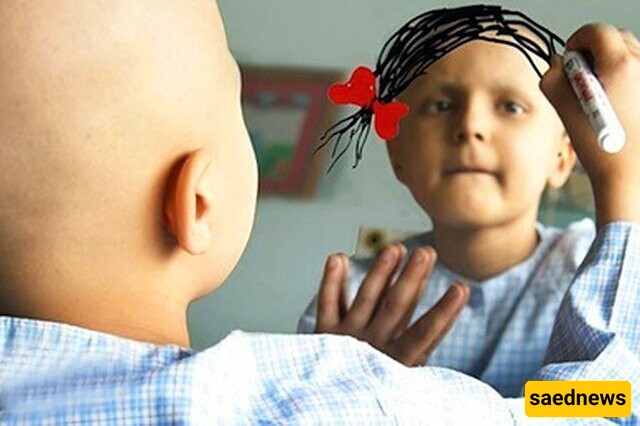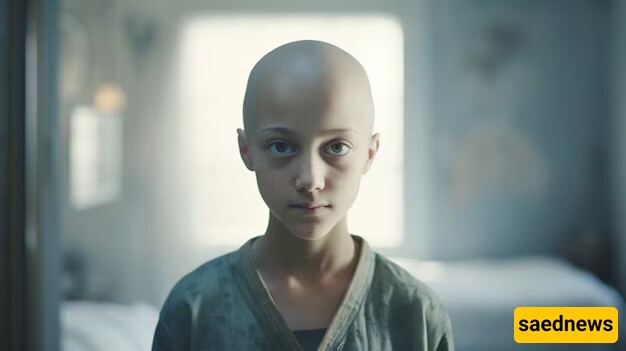Cancer is essentially a genetic disorder that starts at the cellular level in one or more points of the genetic material.

According to the family magazine service of Saed News, cancer is essentially a genetic disorder that starts at the cellular level in one or more points of the genetic material. These disorders, such as breaks or abnormalities in DNA sequence and composition, can be acquired due to environmental factors like radiation, chemicals, hormones, various pollutants, smoking, stress, and predisposing underlying diseases, or they can be inherited as a congenital predisposition from parents. These genetic mutations can manifest at different times in life depending on the type of disorder.
To gain a deeper understanding of hereditary and non-hereditary cancers, we had a conversation with Dr. Hassan Roudgari, a cancer genetics specialist and researcher at the University of Aberdeen, UK:
20% of Cancers Are Hereditary and Predictable
Dr. Roudgari explained, "More than 80% of cancer occurrences worldwide are of the acquired type and are generally unpredictable until they occur. However, a high-risk lifestyle can significantly increase the chances of developing cancer. On the other hand, hereditary cancers allow for risk calculation, reduction of occurrence through invasive and non-invasive preventive measures, and the possibility of early diagnosis to extend the patient's life. It is important to note that the age, nature, severity, and recurrence rate of similar or different cancers in hereditary cases can differ from acquired types and be estimated."
He highlighted the physical, emotional, economic, and social challenges posed by cancer, stating, "Despite significant advancements in science, cancer remains an incurable or difficult-to-treat disease that progresses and severely impacts the patient's health. The uncontrolled proliferation and spread of cancer cells can evade the body's natural immune systems, leading to increased energy consumption and ultimately extreme weakness. Without effective and appropriate treatment, the disease can spread to other vital organs and cause death."
Dr. Roudgari noted that some cancers, due to their genetic nature and pathology, progress slowly, such as prostate cancer, while others, like pancreatic cancer, progress very quickly. The danger level of cancer depends on the initially affected organ, such as liver, kidney, lung, brain, etc., and the associated survival rate. For instance, some leukemias and non-Hodgkin lymphomas can spread aggressively and shorten the patient's life span.
He also discussed the psychological, economic, and social side effects of cancer, explaining, "Some side effects are due to the disease itself, and others stem from the side effects of treatments, which weaken the patient's physical and mental state. Due to the severity of the disease and its debilitating nature, patients experience reduced life expectancy, severe symptoms and side effects from heavy chemical medications, financial and social pressures from treatment costs, and distance from normal work and activities. Additionally, physical and emotional dependence on caregivers and severe disruptions to daily life result in complex physical, psychological, economic, and personality damages that require specialized and comprehensive multidisciplinary care."
Dr. Roudgari continued, "Unfortunately, due to severe deficiencies in the supply of specialized cancer medications, patients and their families are often deeply involved in obtaining these medications and ensuring their authenticity. The high costs, especially for imported drugs, and the inadequacy of the domestic pharmacopeia for providing all necessary items, have led to an unreliable black market for cancer drugs. In developed countries, hospital pharmacies are responsible for procuring and dispensing specialized cancer medications, and patients and their families have no direct involvement in this process. However, in our country, people must not only cope with the severe and debilitating illness of their loved ones but also worry about obtaining medications, sometimes spending millions of tomans out of pocket without insurance coverage and even selling their assets and property to fund treatment."
The Likelihood of Increased Cancer Rates Among Iranians in the Coming Years
Dr. Roudgari, the Secretary of the Research Council of the Iranian Medical System Organization, commented on the prevalence of cancer in Iran: "According to the latest statistics from the Ministry of Health, approximately 100,000 people are diagnosed with cancer annually in Iran, which is lower than the prevalence in developed Western societies. Therefore, cardiovascular diseases, road accidents, and other incidents remain the leading causes of death in Iran. However, due to the aging population, risky behaviors such as poor diet, air pollution, lack of physical activity, and increased stress factors, it seems that cancer rates are on the rise and may continue to increase more rapidly compared to previous decades."
According to Dr. Roudgari, the Ministry of Health statistics show that cancer-related deaths and disabilities result in the loss of 450,000 years of life in Iran, equating to approximately 21 years per patient. The direct and indirect costs of cancer are estimated to be around 10,000 billion tomans annually, with one-third of that amount related to treatment and medication expenses. Given these figures and the high human and financial costs of cancer, it is crucial to prioritize prevention and early diagnosis over treatment. Identifying risk factors in the country and reducing their impact, recognizing high-risk groups, and implementing national screening programs for cancers that allow for timely prevention, risk reduction, early detection, and more effective treatment with better prognosis should be prioritized in the healthcare system. Developing risk estimation guidelines based on epidemiological data and other scientific indicators should also be a priority in healthcare and education sectors.
He added, "Currently, in developed societies, national screening programs have significantly reduced the human and economic costs associated with common cancers through timely detection and early diagnosis. In Iran, screening may exist at regional study levels, but unfortunately, it has not become a comprehensive national program, and its absence is deeply felt."
How to Prevent Non-Hereditary Cancers
Dr. Roudgari further explained the factors contributing to cancer and methods of prevention: "For acquired cancers, reducing risk factors and increasing preventive measures can lower the risk of cancer. Fortunately, most people are familiar with the major causative factors, and we only need individual determination and national planning to avoid or mitigate these factors' effects."
He emphasized, "Generally, by providing awareness about cancer-causing factors and prevention methods, we can guide the public towards a healthy lifestyle free from cancer risk factors. Implementing precise health and preventive regulations by responsible institutions also plays a crucial role in reducing cancer risk in the country."
Dr. Roudgari outlined several simple guidelines for reducing general cancer risks:
Increase the consumption of fruits and vegetables, especially organic varieties.
Increase the intake of fluids, particularly water and healthy milk, as diluents for toxins.
Reduce time spent in polluted urban air.
Decrease the consumption of high-calorie foods like fast food and avoid obesity.
Increase physical activity.
Avoid smoking and consuming alcoholic beverages.
Establishing Specialized Clinics to Reduce the Risk of Hereditary Cancers
Regarding the prevention and treatment of hereditary cancers, Dr. Roudgari stated, "For hereditary cancers, the possibilities for early prevention and diagnosis are significantly higher than for acquired types. With specialized guidelines, we can estimate risks and, through diagnostic evaluations and early screenings, identify and treat cancers at the earliest stages. Preventive medical and surgical interventions can reduce risk by up to 100%."
He added, "Currently, many known genes involved in common cancers have been identified, and diagnostic methods exist to confirm genetic disorders in potential gene carriers. Unfortunately, clinical genetics and specialized genetic counseling clinics are not well-established in our country, and the necessary systems for institutionalizing clinical processes are lacking. In Iran, consultations are primarily conducted by graduates of medical-related fields who have taken short courses or by general practitioners and even non-physicians with degrees in genetics or laboratory-related sciences."
Dr. Roudgari emphasized, "In Iran, there are no specialized clinics for estimating, consulting, and reducing risks for hereditary cancers, and the diagnosis and treatment of these cancers are approached similarly to acquired types. However, the presence of specialized clinics for hereditary cancers can play a significant role in preventing these types of cancer."
He suggested, "Training specialized personnel for clinical genetic counseling and establishing a network of related clinics should be part of the Ministry of Health's agenda to gradually integrate them into the health referral system. Genetic clinics can be located within diagnostic, treatment, and educational centers, receiving direct or indirect referrals and providing results for further actions after specialized evaluations."
The Necessity of Having a Specialized Psychiatrist in the Cancer Treatment Team
Dr. Rudgari, Secretary of the Research Council of the Medical System Organization, emphasized the importance of hope in the treatment process for cancer patients. Despite the discovery and application of new treatment methods that have achieved many successes, cancer remains a deadly and debilitating disease. In the general culture of society, for many, cancer is equated with imminent death.
Dr. Rudgari continued, "The primary goal in treating any severe illness is to extend the patient's life or improve their quality of life from diagnosis until death. In some terminal and final stages, all specialized treatments may be stopped, and only palliative therapies (to reduce symptoms and pain) are prescribed. The thought of imminent death can conflict with the patient's and their loved ones' morale and hope, leading to a decline in life quality, motivation, and cooperation with treatment, exacerbating the patient's decline. There have been numerous reports worldwide of patients fighting the toughest cancers and ultimately overcoming them. This victory was due to these patients rejecting the philosophy that cancer equals imminent death. If death from cancer is inevitable, the patient still deserves the highest possible quality of life during their remaining time, which is partly determined by the quality of care they receive and largely by their beliefs."
Dr. Rudgari concluded by highlighting the need for specialized psychiatrists in the cancer treatment team. "Unfortunately, in our country, there are fewer experienced psychiatrists specializing in the psychological and emotional consequences of cancer. Even if such specialists exist, they are not an essential part of a cancer treatment team. Considering such a multidisciplinary team of specialists remains a dream for cancer patients in our country, where providing cancer medication itself is still a major challenge."


